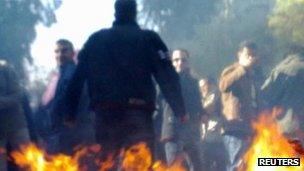Syria unrest: Dozens of army deserters 'gunned down'
- Published

Dozens of army deserters have been shot dead by Syrian troops as they tried to flee their bases and join anti-government protests, reports say.
Activist groups said more than 70 defectors were gunned down in the north-western Idlib province.
They said Monday's death toll across the country could exceed 110 - which if true would make it one of the deadliest days of the uprising.
Damascus earlier agreed to an Arab League deal to allow monitors in.
Syrian Foreign Minister Walid Muallem said the Arab League had accepted amendments demanded by Damascus.
The Arab League said an advance team of observers would go to Syria this week.
In a separate development, the UN General Assembly voted by a strong majority to condemn the Syrian authorities for the crackdown, which has left some 5,000 people dead since the protests against President Bashar al-Assad began in March.
The non-binding resolution - passed by a vote of 133 to 11, with 43 abstentions - demanded an immediate end to human rights abuses and called on Damascus to implement the Arab League plan.
Deal 'amendments'
On Monday, the London-based Syrian Observatory for Human Rights said a soldier who defected had reported the deaths of 60-70 army deserters by machine-gun fire in Idlib province - the main stronghold for army defectors.
"They were killed while trying to run away from their military positions on the way between the villages of Kansafra and Kafrouaid, in Jabal al-Zawyia, in Idlib district," the group said.
The Observatory said another 40 people had died across the country, including three government soldiers were killed in fighting with armed rebels in Idlib.
The Syrian Revolution General Commission - a coalition of 40 opposition grassroots groups - said the number of defecting soldiers who died in Idlib reached 72.
Overall, it said, 114 people had died across the country on Monday, a toll which included nine deaths in Deraa and nine in Homs.
The claims cannot be independently verified as foreign media are banned from reporting in Syria.
The government of President Assad says it is fighting armed gangs, trying to destabilise Syria.
The alleged shooting of the deserters came just hours after Damascus finally put its signature to the Arab League deal to deploy observers in Syria.
After the protocol was signed at the Arab League's headquarters in Cairo, Syrian Foreign Minister Walid Muallem said Damascus had agreed because it wanted help to find a "political solution".
"We want to emerge from this crisis and build a safe, modern Syria - a Syria that will be a model of democracy," he said.
"The signing of the protocol is the beginning of co-operation between us and the Arab League and we will welcome monitors."
Syrian Foreign Minister Walid Muallem: "We do not seek to waste time. It is us seeking a solution"
He said Syria's sovereignty would be protected because the Arab League had agreed to amendments to the deal, which also calls for all violence to be halted, for the withdrawal of troops from the streets and the release of detainees.
The observers would be "free" in their movements and "under the protection of the Syrian government", he added, but would not be allowed to visit sensitive military sites.
Mr Muallem said he was confident that the observers would support the government's assertion that "armed terrorist groups" were stirring up trouble, and targeting security personnel and civilians.
Damascus 'manoeuvring'
The Arab League's Secretary General, Nabil al-Arabi, told reporters that an advance party led by one of his assistants would travel to Syria in the next two or three days to prepare for the arrival of monitors.
The observers will have a one-month mandate that can be extended by another month if both sides agree.
But the leader of the Syrian National Council, an opposition umbrella group, dismissed the government's decision as "just a ploy".
The BBC's Jim Muir in Beirut says there is much scepticism in activist circles about the government's willingness to implement a peace plan which could result in large parts of the country falling out of its control.
Since mid-November, Syria wavered on whether to agree to the deployment of observers, prompting the Arab League to impose a range of economic sanctions.
In that time, more than 900 civilians have been killed by Syrian security forces, including 80 children and 29 women, according to the LCC.